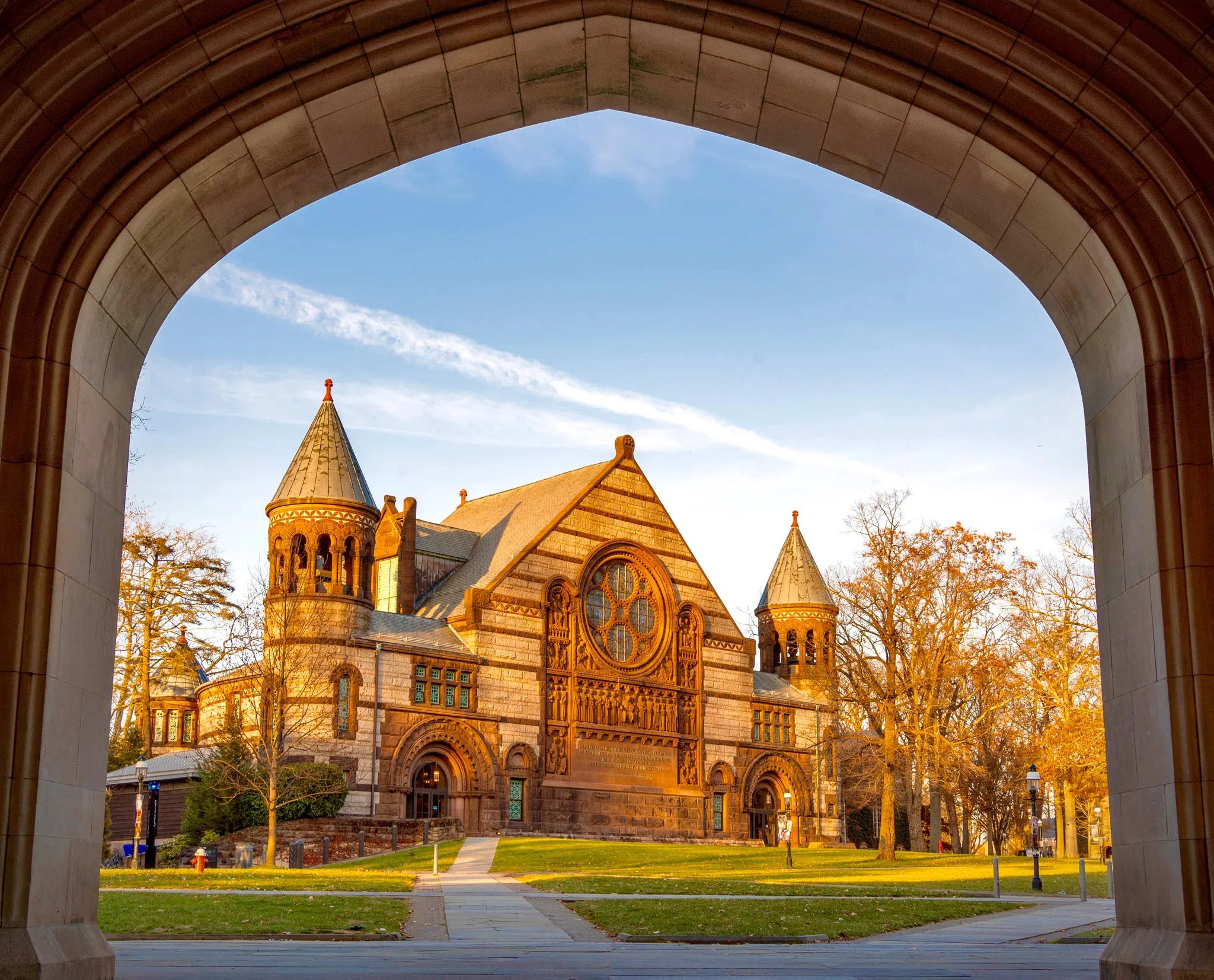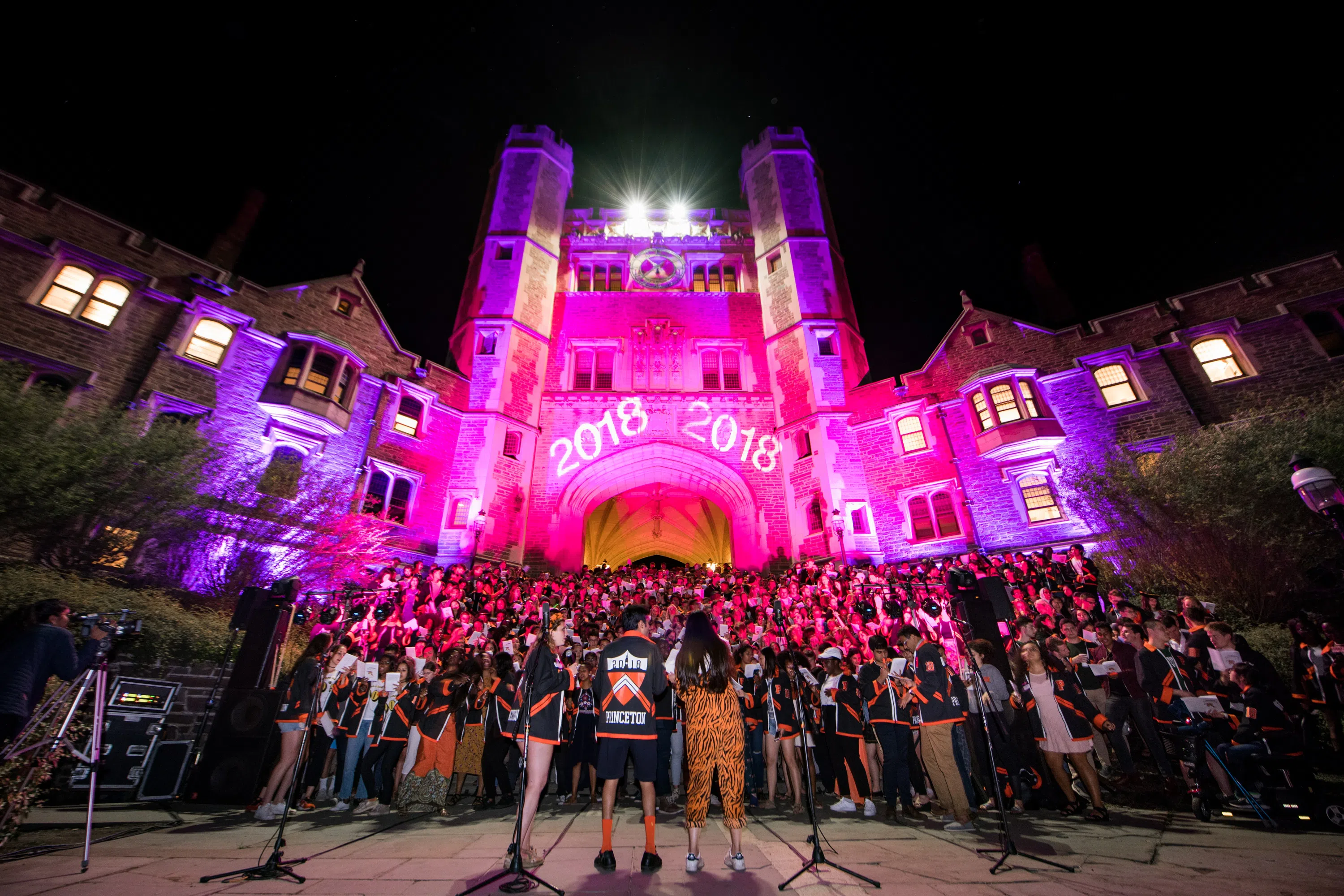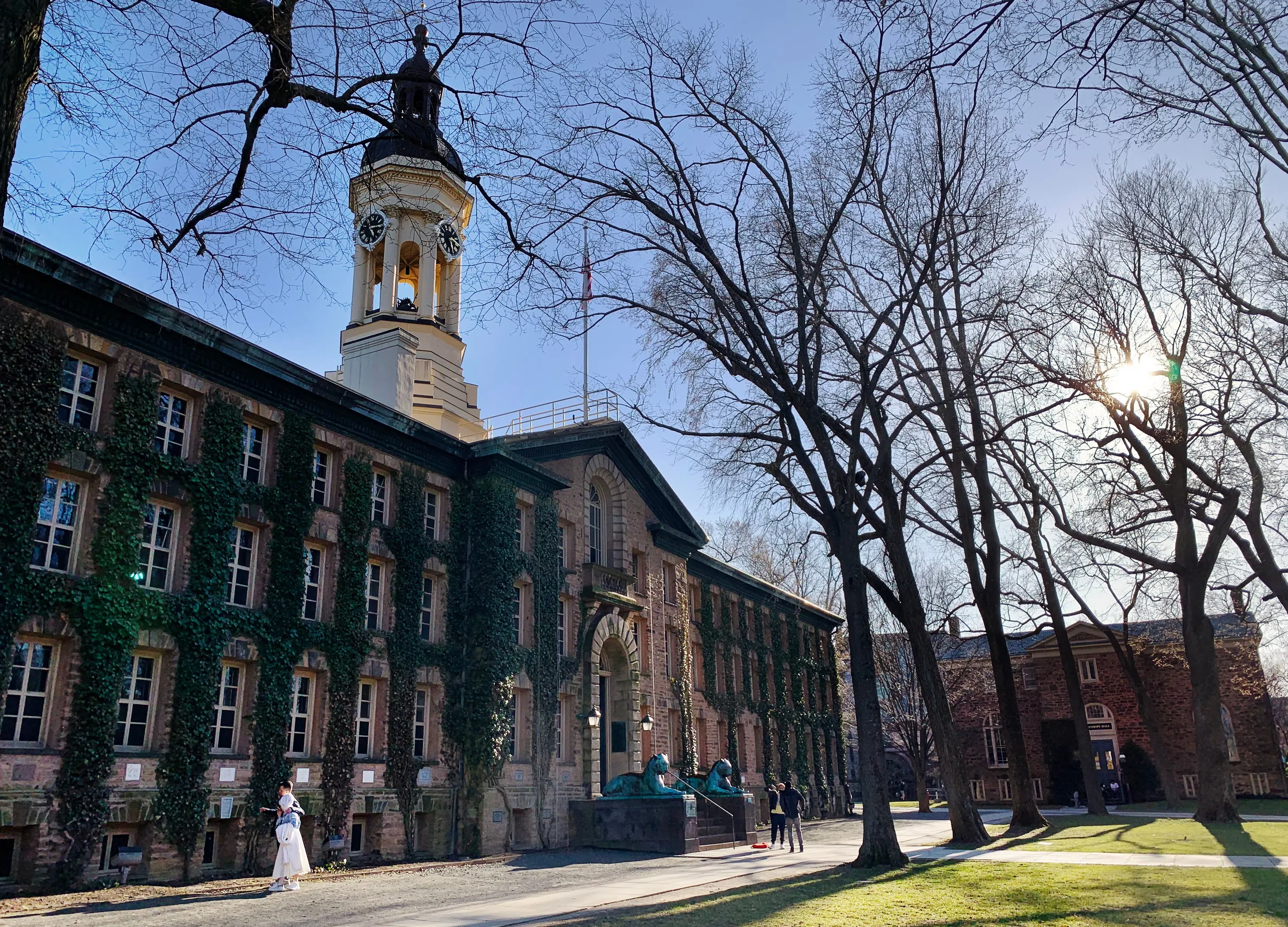Media Gallery
Dining
Residential Colleges
Transitioning to College
Arch Sing
⭐ Dining
Princeton offers an array of dining options for all students. All first-years and sophomores are required to have a University meal plan, and have access to five dining halls across campus, numerous cafes, and grab-and-go dining options. Juniors and Seniors have many dining options beyond the dining halls, including being a part of eating clubs.
Dining Halls
All Princeton first-year students and sophomores are required to be on the unlimited University meal plan for their first two years. There are five dining halls across campus: Rocky/Mathey, Whitman, Forbes, Butler/Wilson and the Center for Jewish Life (CJL). Students do not have to eat at the dining hall of their residential college, and the menus for each dining hall are posted online each day. Dining halls help foster a sense of community because although they are large enough to serve the student body yet they are small enough where you will always see someone you know.
Late Meal
On weekdays, after the dining hall closes for lunch or dinner, students on the meal plan have a certain credit they can spend at the Frist Food Gallery (in case students cannot eat during regular dining hall hours, or they are still hungry). Between a grill, a salad bar, a waffle station, and more, the Frist Food Gallery has a lot of delicious snacks and Late Meal is a popular gathering spot among first-years and sophomores.
Upperclass Dining
Juniors and seniors have a number of dining options to chose from: joining an eating club, staying on a meal plan, going independent or joining a co-op. All students who are not on the meal plan have two free dining hall swipes per week, which ensures that they can stay connected to their friends who eat in the dining halls.
Eating Clubs
Princeton Eating Clubs are part of a tradition that dates back to 1879. In the early years, the University did not provide students with dining facilities, so students created their own clubs to provide comfortable houses for dining and social life. Eating clubs are unique to Princeton and the most popular dining and social option for students in their junior and senior years.
Eating Clubs are entirely optional and are only open to juniors and seniors; approximately 60% of juniors and seniors join one of the 11 eating clubs. Each club has its own kitchen and dining staff who prepare meals for members. Seven of the eleven clubs are selective “bicker” clubs; the other four are non-selective “sign-in” clubs.
The eating clubs line Prospect Avenue (expect for Terrace, which is on Washington Road), and each have their own distinctive character. These nonresidential facilities are operated not by the University, but instead by student officers with the support of independent alumni trustee boards.
Eating Clubs are entirely optional and are only open to juniors and seniors; approximately 60% of juniors and seniors join one of the 11 eating clubs. Each club has its own kitchen and dining staff who prepare meals for members. Seven of the eleven clubs are selective “bicker” clubs; the other four are non-selective “sign-in” clubs.
The eating clubs line Prospect Avenue (expect for Terrace, which is on Washington Road), and each have their own distinctive character. These nonresidential facilities are operated not by the University, but instead by student officers with the support of independent alumni trustee boards.
Going Independent
Juniors and Seniors who choose to go independent will cook for themselves, and live in dormitories with easy access to communal kitchens. Although there are no grocery stores within walking distance, there are big grocery stores on nearby Route 1, and Princeton has a bus on the weekends that will shuttle students to and from these stores.
Co-ops
There are several “co-ops” at Princeton: the vegetarian “2-D,” located at 2 Dickinson Street, the Brown co-op in Brown Hall, the International Food Co-op (IFC) in Laughlin Hall, the Real Food Co-op in Edwards Hall and the Scully Co-op in Scully Hall. Each co-op has their own dedicated kitchen space, and members alternate cooking meal shifts, eat together and share the associated chores.
⭐ Residential Colleges
Princeton has a residential college system, where students are assigned to one of six residential colleges. Housing is guaranteed for all four years, and 98% of students live on campus. The six Residential Colleges are at the center of undergraduate life and offer close-knit, comfortable communities where you will live, eat, study, and socialize.
What is a Residential College?
Incoming first-years are randomly assigned to one of six residential colleges: Butler, Mathey, Forbes, Rockefeller, Whitman or First. The colleges provide a smaller community and support network for students to begin their collegiate experiences. Housing is guaranteed to all undergraduates, and 98 percent of students live on campus all four years. Each residential college consists of a cluster of dormitories with its own dining hall as well as other facilities. These include lounges, game rooms, computer clusters, seminar rooms, libraries, kitchenettes and laundry facilities.
Princeton has begun construction on two new residential colleges in the southern portion of campus, which are temporarily known as College 7 and College 8. Additionally, on the site of First College the University will begin construction on Hobson College. Hobson College, named for Mellody Hobson '91, co-CEO of Ariel Investments, will be the first residential college at Princeton named for a Black woman.
Princeton has begun construction on two new residential colleges in the southern portion of campus, which are temporarily known as College 7 and College 8. Additionally, on the site of First College the University will begin construction on Hobson College. Hobson College, named for Mellody Hobson '91, co-CEO of Ariel Investments, will be the first residential college at Princeton named for a Black woman.
Who Lives There?
Princeton’s residential college system is designed to house approximately 400-500 first-years and sophomores, 100 juniors and seniors, and 10 graduate students in each college. Entering first-year students are assigned randomly to one of the six colleges, and at the end of sophomore year students can choose whether to live in their respective four-year college or move to upper class housing.
Dorm Rooms
Princeton dorm rooms range from single rooms to suites of up to 11 people. Dorm rooms vary widely throughout the campus and within each residential college, but all colleges have a variety of singles, doubles, and quads.
As of 2017, all dorms in the room draw are available as gender-inclusive, meaning sophomores, juniors, and seniors can select a room with other students of any gender. However, incoming first-years will be placed in single-gender rooms unless they express interest in gender-inclusive housing. Communal bathrooms within dormitories are single-gender, however, single-occupancy or private bathrooms are also available within some dormitories. The LGBT Center maintains a map of gender-neutral bathrooms and shower facilities on campus.
As of 2017, all dorms in the room draw are available as gender-inclusive, meaning sophomores, juniors, and seniors can select a room with other students of any gender. However, incoming first-years will be placed in single-gender rooms unless they express interest in gender-inclusive housing. Communal bathrooms within dormitories are single-gender, however, single-occupancy or private bathrooms are also available within some dormitories. The LGBT Center maintains a map of gender-neutral bathrooms and shower facilities on campus.
Roommates
During a student's first year, roommates are randomly assigned, although first-year students will fill out a rooming preference form the summer before their first year that is used to pair students. Sophomores are able to choose their roommates within their residential college and juniors and seniors can room with whoever they want, regardless of residential college affiliation.
⭐ Transitioning to College
Your residential college will be home to various resources to help you transition into college and navigate both the academic and social landscape at Princeton.
The "Zee" Group
Residential College Advisers (RCAs) and Assistant Residential College Advisers (ARCAs) are juniors and seniors who live in the colleges and provide support for a small group of first-years and sophomores, referred to as an advisee group or a "zee" group for short. In some residential colleges, the RCAs and ARCAs work together to support both first-years and sophomores, while in others the RCAs advise only first-year and the ARCAs advise only sophomores.
RCAs help students transition to Princeton during their first year in addition to resolving conflicts, serving as a resource, and hosting study breaks. Peer Academic Advisers (PAAs) are sophomores, juniors and seniors that work closely with the advisory groups to provide academic support from a student perspective.
RCAs help students transition to Princeton during their first year in addition to resolving conflicts, serving as a resource, and hosting study breaks. Peer Academic Advisers (PAAs) are sophomores, juniors and seniors that work closely with the advisory groups to provide academic support from a student perspective.
Academic Advising
Beyond living facilities, Residential Colleges are fully staffed with administrators who are there to help students in all aspects of life on campus. Faculty resources in the residential colleges include a college head, dean, director of studies and director of student life who work together to oversee the college and its students. In addition, each college has several faculty fellows who host intellectual discussions, lectures and luncheons within the colleges.
Academic advising of first-years and sophomores is also centered in the residential colleges. Every first-year in the Bachelor of Arts (A.B.) program is assigned to a faculty adviser who assists with course selection and other academic matters throughout the year. The adviser works with 12-14 students and continues as the student’s adviser through the sophomore year, though students can request to switch. First-years in the Bachelor of Science in Engineering (B.S.E.) program are advised by faculty members in the School of Engineering and Applied Science, and B.S.E. sophomores receive advising within their department.
Academic advising of first-years and sophomores is also centered in the residential colleges. Every first-year in the Bachelor of Arts (A.B.) program is assigned to a faculty adviser who assists with course selection and other academic matters throughout the year. The adviser works with 12-14 students and continues as the student’s adviser through the sophomore year, though students can request to switch. First-years in the Bachelor of Science in Engineering (B.S.E.) program are advised by faculty members in the School of Engineering and Applied Science, and B.S.E. sophomores receive advising within their department.
⭐ Arch Sing
Princeton has many arches around campus that lend themselves to wonderful acoustics. For many years the sounds of Princeton’s a cappella groups have been echoing in arches across campus. Arch sing is a moment for a cappella groups to perform their songs and for students to enjoy their harmony.


